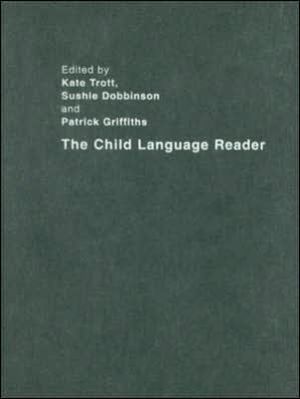

 |

|

The average rating for The Child Language Reader based on 2 reviews is 3.5 stars.
Review # 1 was written on 2017-10-05 00:00:00 KEN ERRARA KEN ERRARAI have had a long interest in linguistics--especially the practices of swearing, euphemism, and politeness--so I picked up Forbidden Words with excitement. Unfortunately, while there are interesting nuggets of information, the book is rendered unreadable and untrustworthy by the authors' political and personal biases. To give a simple example, in the chapter on jargon, the authors write, "There is no convenient substitute for some jargon: to replace legalese defendant with a person against whom civil proceedings are brought is communicatively inefficient. Legal language is difficult because laws are complex, and not because lawyers try to obfuscate. We would argue the same for linguisticalese in the earlier quote..." (p. 67). But earlier, in the same chapter, in a discussion of bureaucratese, the authors claim, "The matters with which bureaucrats deal are mostly mundane and can be fully described and discussed in sixth-grade English. In order to augment their self-image, therefore, bureaucrats create synonyms for existing vocabulary using a Graeco-Latinate lexicon, seeking to obfuscate the commonplace and endow it with gravity; this achieves a double-whammy by mystifying and intimidating the clientele" (p. 62). Why is the jargon of linguists and lawyers necessary to avoid inefficient communication, but the jargon of bureaucrats is pretentious obfuscating nonsense? The authors never explain this value judgement, but they do give an example of what they call bureaucratese later in the book. In a discussion of a euphemism for parking spots, they write, "...they are probably dispreferred because they do not have the Latinate ring of bureaucratese. It is comparable with the upgrade of potholes to pavement deficiencies...." (p. 239). This is an example that is used throughout the book, but a little research and common sense shows that pavement deficiency is not used in civil engineering and government as a euphemism for pothole, but as a general term that refers to many different problems that can occur with roads and sidewalks, including cracking, roughness, poor drainage, and, yes, potholes. A pothole is a single type of pavement deficiency, and the term pavement deficiency is used for the same reasons that lawyers use the term defendant, to achieve efficient communication among specialists. Claiming or implying that pavement deficiency is a pompously bureaucratic euphemism for pothole is simply factually incorrect. These unsupported assumptions call into question the authors' credibility. The chapters of the book on political correctness, along with the sections dealing with AIDS and military language are nearly unreadable. I expected a rather academic work on taboo and language and instead received a political rant about the Religious Right's take-over of Australia and America. Even in the cases where I agreed with the authors' politics, the issues have been better debated and discussed elsewhere. They should have stuck with linguistics. |
Review # 2 was written on 2016-04-28 00:00:00 Amit Persaud Amit PersaudI only picked this book up for research purposes. As a result, I read the entire chapter on sexual taboos, and then skipped around the book looking for information about language about homosexuality. So, take my opinion with a grain of salt, I haven't read the whole book. That said: this strikes me as overly-general, and it relies too much on unproven assumptions. Over and over, the authors will say that a particular euphemism was used, without giving any context to where, when, and why. It's hard to get a nuanced understanding of the words they talk about when the only discussion of them is a long list of euphemisms - many of which, I suspect, have been used in different ways over time and in different places - and there's a short set of generalizations made about them. It also makes it hard to assess where the authors are getting their information from. When you're talking about words that gay communities have reclaimed, there's a lot of tension between people who want to use the words for themselves and people who find them offensive in any context - just look at the debate within LGBT communities over whether or not we should be calling ourselves the 'queer community'. This book acknowledges none of that tension, instead taking one sub-culture's usage (or lack thereof) of any given word as universal within the LGBT community. There is some useful and interesting information in this book, but it's undercut by how general it is, and how incomplete the information feels. |
CAN'T FIND WHAT YOU'RE LOOKING FOR? CLICK HERE!!!